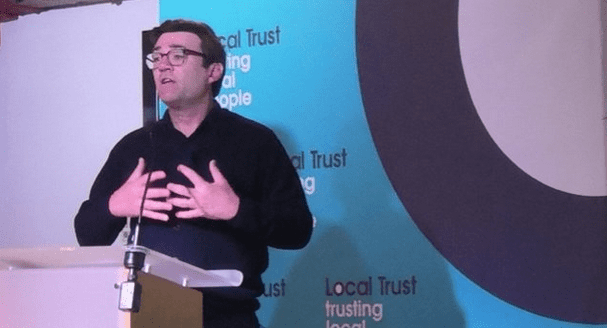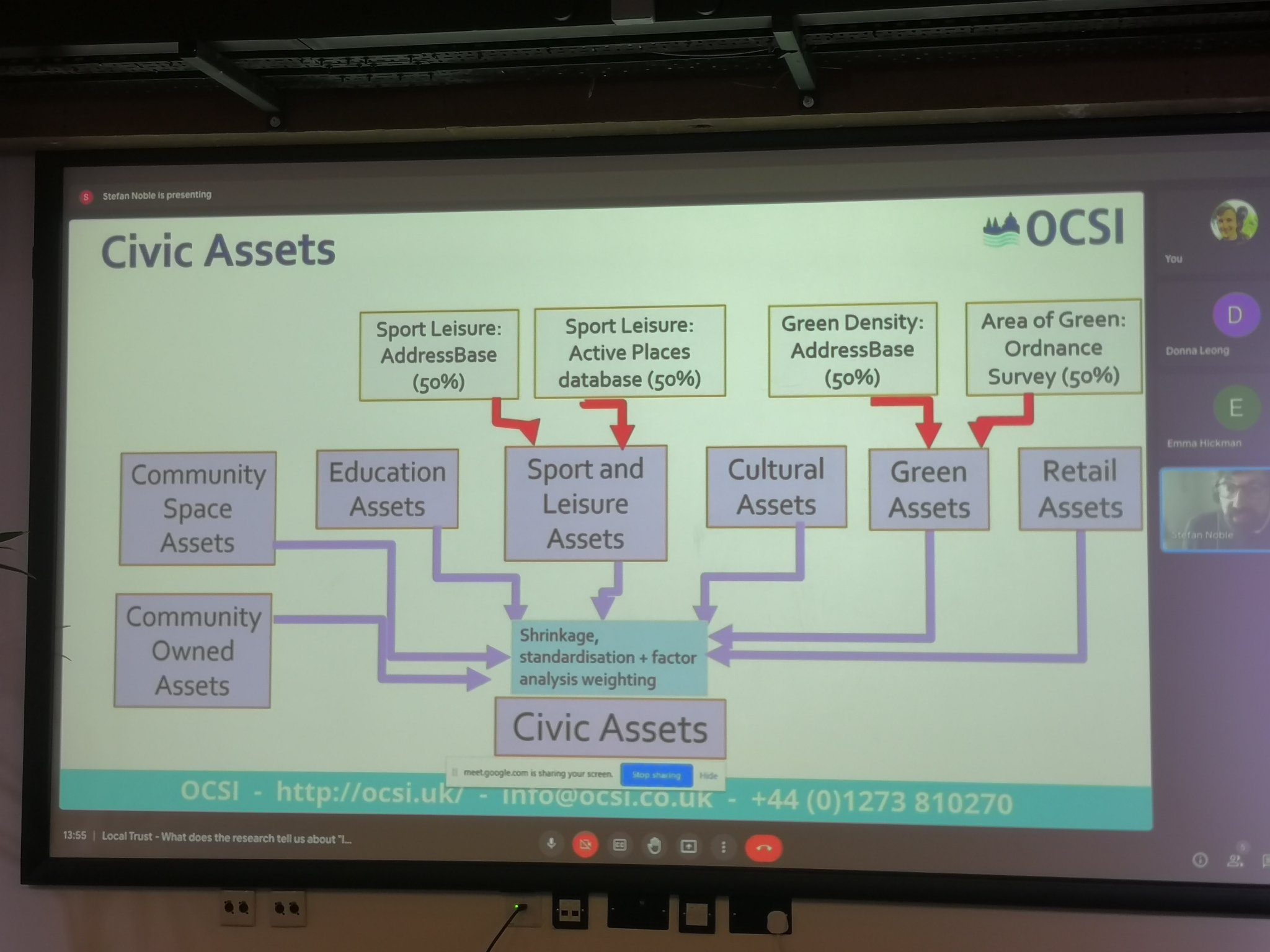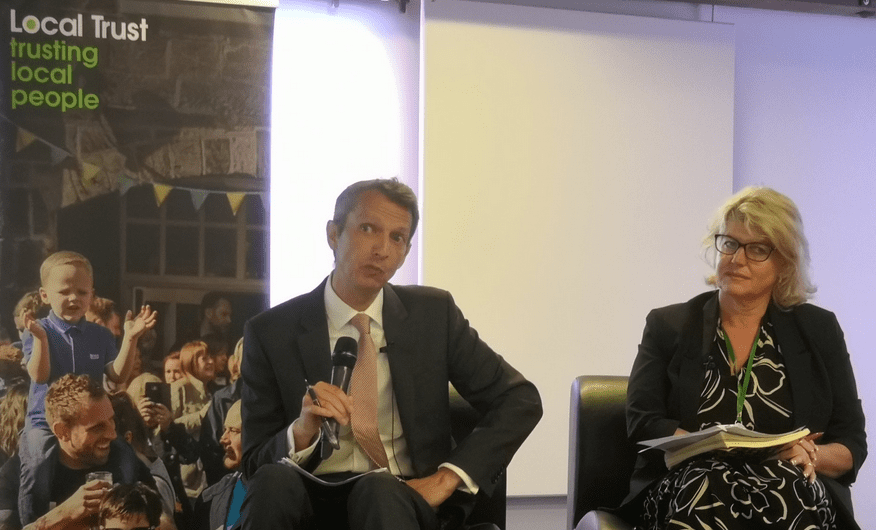Our chief executive, Tom Chance, writes about Local Trust’s recent conference on the evidence base around levelling up. Can community power be focused on levelling up the basics like housing, and focus more on the role of land?
Can we level up left behind communities without fixing the basics? That was one of Andy Burnham’s challenges to a Local Trust conference this week.

If people in Greater Manchester can’t get a decent, secure job; if almost half the private rented homes fail basic standards of decency; if buses in the most deprived areas are infrequent and expensive; then community led initiatives – as wonderful and important as they are – can’t turn the area around alone. There were echoes of Danny Kruger MP’s critique of the Big Society.
Professor Jennie Popay added to this cold water based on an 8-years-and-counting study of the Big Local programme, called Communities in Control. While the community led programme has had remarkable successes – such as measurably lower crime and anxiety compared to similar places – these successes are less marked in the poorer, more marginalised Big Local areas. The benefits were also less noticeable among women than men, and so on through the different dimensions of marginalisation.
So community led action is positive and this needs much more recognition. The conference did a brilliant job at bringing out the evidence in support of this. (See Matt Leachs’ blog for a good rundown.)
But the positive impact is shaped and distorted by the underlying inequalities – Burnham’s basics.
Other speakers at the stimulating conference posed other questions that connect to this point.
Professor Peter Tyler shared some points from his comprehensive evaluation of the New Deal for Communities programme in the 2000s. This was the last time government ran a really comprehensive, holistic programme to regenerate areas we now call ‘left behind’. One of the secrets to its successes, he told us, was integrating mainstream service provision – the basics – into the programme through partnerships between those service providers and councils, SMEs and community groups.
It’s curious, then, that in much of the discussion about community power and levelling up, largely absent is discussion about these basics, and partnerships with mainstream providers of these basics.
You can see this absence, for example, in this otherwise quite brilliant data-led study by OCSI for the Local Trust. Homes don’t feature as a measure of civic assets or civic life.

This is reflected in other thematic policies and programmes.
The Community Ownership fund can be used for pubs but not homes; for saving existing community centres but not creating new community spaces as part of mixed-use development; Homes England will fund affordable homes but not the community spaces that could go with them; Power to Change funded a housing programme, then closed that and moved on to high streets.
But at the community level, these all need to be integrated.
The evaluation of Power to Change’s housing programme in the Tees Valley, Liverpool, Leeds, Birmingham and Bristol has found a hugely varied and integrated engagement with these basics: homes for the most marginalised – such as single parents, care leavers and people recovering from addiction; bringing empty homes into use, and repurposing empty retail units as homes; homes integrated with workspace, retail, food growing, social spaces, cultural facilities; and all the way through creating jobs, apprenticeships and training for those furthest from the labour market.
For a longstanding CLT like Homebaked the connection between high streets, housing, jobs, food growing and community spaces is obvious, as are the benefits of partnering with a (mainstream) housing association to deliver some of this. It’s all there on their little terrace opposite Liverpool football club.
The much newer Jaywick Sands CLT – in England’s most deprived area – is trying to buy a long-disused building in which they already run a charity shop and food bank, and want to convert the upper floors into affordable flats.
What they’re both struggling to do is buy these assets before they get too valuable, so they can lock in the land value for long-term community wellbeing. American Economist Raghuram Rajan spoke about the importance of getting in before regeneration drives the values up, but the topic of land is also largely absent from discussions about community power. There is no equivalent to the American Land Bank movement or the Scottish land reform movement in England, and little recognition of the value that CLTs can bring in holding land value for community benefit.

There was one other missing connection that struck me.
In his opening address, Andy Haldane argued that levelling up can’t happen without devolution. He believes our overly centralised government is incapable of responding to the varied issues of left behind places, and more local power is needed.
Is there not an analogous point to be made about the private and third sectors when it comes to Burnham’s basics?
Housing – both via the private and social sectors – has become increasingly centralised in recent decades. Small builders were wiped out with each successive economic downturn, never to return, and the big volume builders have become increasingly dominant. Housing associations have merged into ever-larger social developers, gaining capacity to build but losing connection to the communities they grew out of. Similar trends seem to be in play with agricultural, commercial and retail landholdings.
Is there a case to re-localise the ownership of land and the provision of housing? Perhaps by integrating it into local partnerships, as Peter Tyler spoke about. Perhaps through the kinds of partnership models that Community Land Trusts have been pioneering. Perhaps also enabling those CLTs to integrate housing with land, high streets, jobs, community spaces and more? To provide a platform for the social infrastructure that the Local Trust did so much to highlight with their conference.
To fix the basics and build community while they do it.
